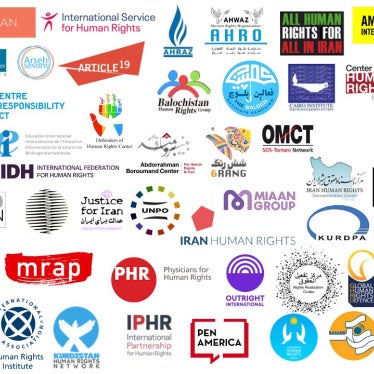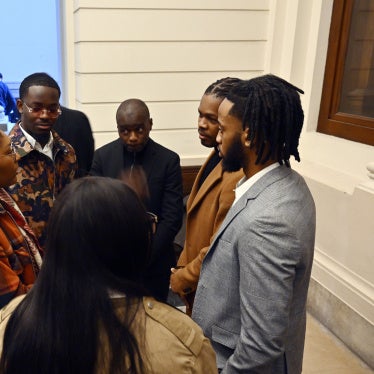Did the Wikileaked State Department cables that described Tunisia's deposed leader Zine el-Abedin Ben Ali as the head of a corrupt police state play any role in encouraging the democratic uprising against him -- and thus spark the wave of protests now spreading across Egypt?
I asked our experts at Human Rights Watch to canvass their sources in the country, and the consensus was that while Tunisians didn't need American diplomats to tell them how bad their government was, the cables did have an impact. The candid appraisal of Ben Ali by U.S. diplomats showed Tunisians that the rottenness of the regime was obvious not just to them but to the whole world -- and that it was a source of shame for Tunisia on an international stage. The cables also contradicted the prevailing view among Tunisians that Washington would back Ben Ali to the bloody end, giving them added impetus to take to the streets. They further delegitimized the Tunisian leader and boosted the morale of his opponents at a pivotal moment in the drama that unfolded over the last few weeks.
This point might not be worth dwelling on, except that it suggests something interesting about how the United States, and the State Department in particular, approaches the challenge of promoting human rights and democracy in countries like Tunisia. Consider the following proposition: None of the decent, principled, conscientious, but behind the scenes efforts the State Department made in recent years to persuade the Tunisian government to relax its authoritarian grip -- mostly through diplomatic démarches and meetings with top Tunisian officials -- had any significant impact on the Ben Ali regime's behavior or increased the likelihood of democratic change. Nor did the many quiet U.S. programs of outreach to Tunisian society, cultural exchanges and the like, even if Tunisians appreciated them and they will bear fruit as the country democratizes.
Instead, the one thing that did seem to have some impact was a public statement exposing what the United States really thought about the Ben Ali regime: a statement that was vivid, honest, raw, undiplomatic, extremely well-timed -- and completely inadvertent.
Had anyone at the State Department proposed deliberately making a statement along the lines of what appears in the cables, they would have been booted out of Foggy Bottom as quickly as you can say "we value our multifaceted relationship with the GOT." Most State Department professionals have long believed that explicit public criticism of repressive governments does little more than make the critic feel good. They argue that real progress toward ending human rights abuses or corruption in countries with which the United States has important relationships, like Egypt or Pakistan or Indonesia, is more likely to come when such problems are raised behind closed doors.
Indeed, one of the most delightful ironies of the leaked Tunisia cables is that they make precisely this argument. One missive -- after laying out more juicy details about how and why Ben Ali had "lost touch with the Tunisian people" (the very commentary that, when publicly revealed, actually seemed to affect the situation on the ground) -- concluded that the U.S. should "dial back the public criticism" and replace it with "frequent high-level private candor."
At least in Tunisia, the State Department did not disavow its condemnation of the Ben Ali government after its publication. Elsewhere, officials rushed to deny the obvious. In Sri Lanka, a leaked embassy cable "revealed" the supposedly stunning insight that the country's leaders can't be counted on to prosecute those who committed war crimes in their recently ended fight with the Tamil Tiger rebels, since the leaders were themselves responsible for those crimes. This only confirmed what everyone knew the U.S. government knew about Sri Lanka. Yet the U.S. embassy in Colombo issued a public statement trying to take it back.
American diplomats have many reasons to avoid saying publicly what they think privately about their less savory partners. An obvious and logical one is that they want to preserve relationships that are necessary to advance other U.S. goals -- securing Egypt's support for the Middle East peace process, for example, or shoring up Ethiopia's cooperation in fighting terrorism, or getting Kyrgyzstan's assent to hosting a U.S. military base.
I've always argued to my friends at the State Department that this kind of thinking can be catastrophic in the long run. Consider, for example, how many of the national security threats that the United States has faced in the last decade stem from the misrule of two dictators with whom Washington worked in the 1980s -- Saddam Hussein, and, arguably to a larger extent, Zia ul-Haq of Pakistan. Somewhere in the State Department archives, there is probably a cable from Islamabad circa 1980, incisively analyzing Zia's political repression, his Islamization of Pakistani society and his creation of proxy militant groups, projecting the implications for U.S. interests, yet rationalizing public silence to maintain American influence.
In the short term, there are often trade-offs between public criticism of repressive allies and working with them to advance other U.S. interests. Perhaps Pakistan in the 1980s, after the Soviet invasion of Afghanistan, was such a case -- though one could just as easily argue that the billions of dollars the U.S. provided Zia should have given Washington leverage to improve his domestic policies. In such cases, where U.S. interests truly do require "dialing back" public pressure, U.S. diplomats should at least acknowledge the pragmatic reasons for counseling quiet persuasion rather than pretending it is always the best way to influence dictators.
In reality, no amount of "high-level private candor" was going to convince Ben Ali of Tunisia that allowing free speech or free elections was in his interest, because it plainly wasn't (even if it was very much in the interest of Tunisia as a whole) -- and the same is true for President Hosni Mubarak of Egypt and others like him. Authoritarian rulers do not ease repression or agree to checks on their powers because foreign officials convince them it is a good idea in a private meeting. Such rulers make political concessions when it is necessary to retain the support of key actors in their societies -- from the general population to the security services to economic and political elites.
But depending on the circumstances, public, external pressure really can influence the calculations of these domestic actors. It can help delegitimize rulers in the eyes of their people; it can cause elites to question whether tying themselves to their leader's policies serves their interests; it can encourage and amplify domestic voices calling for change. Precisely because it can be consequential, it is hard to bring such pressure to bear without causing diplomatic friction. The alternative, however, is to be inconsequential.
There is another reason why many American diplomats hesitate to challenge authoritarian governments in public: They believe that those governments will resist reform no matter what the United States says or does. I've had many conversations with State Department officials in which they have said something like: "Sure, our diplomatic engagement with Country X won't make it better on human rights. But neither will sanctions or public criticism or anything else." This cynicism is understandable. History may teach us that authoritarian regimes project a forced (and therefore false) stability -- that over a 20 or 30 year timeframe, most will experience dramatic political upheaval. But at any given moment, the prospects for real human rights progress in places like Uzbekistan, China, or Iran are very small.
If you were a State Department official, and Hillary Clinton asked you every day: "What will the weather be like tomorrow?" and gave you points that you could cash in for career advancement every time you got the answer right, the safest strategy would be to answer that the weather tomorrow will be the same as the weather today. Likewise, on any given Sunday, the safest approach to engaging most of the world's dictatorships is to assume that they will be governed in exactly the same way on Monday, and base policy on that assumption. Why risk diplomatic relationships -- and one's own reputation as a prognosticator -- on strategies for promoting change that are not likely to work before you move on to your next diplomatic post?
It would be rational, for example, for American diplomats to believe that the revolution in Tunisia is unlikely to spur similarly successful popular movements in other authoritarian Arab countries, such as Egypt and Algeria. But by the same token, it would have been rational for them to believe just a month ago that no such revolution was possible in Tunisia. Or to discount the likelihood that the people of Kyrgyzstan would overthrow their corrupt government just weeks before it happened last year. Or to dismiss as a pipe dream that the mighty Soviet Union would fall, and that the powerless Baltic nations would become independent, democratic states, just a year before it happened. If we bet on the stability of authoritarian states, we will be right most of the time, but wrong at the crucial time.
History is made when the weather suddenly changes -- by deviations from the normal course of events. The challenge for American diplomacy is not to wait for shifts in favor of human rights and democracy before scrambling to appear to support them. It is not to wait until a dictator is half-way out the door before you condemn his abuses, freeze his assets, and demand free elections. It is to promote change in repressive states before it appears inevitable. If you think there is only a 10 percent chance that Egypt's post-Mubarak transition will usher in a government that answers to its people, or that in the next few years the Burmese military junta might compromise with the democratic opposition, or that a popular movement might successfully challenge political repression in Iran, then why not do what you can to help raise the odds to 20 or 30 percent? In foreign policy, as in baseball, .300 is a Hall of Fame average.
Political realities mean that American diplomats will use a different tone when confronting human rights abuses committed by a great power like China than a small one like Ivory Coast. They will rightly follow different strategies toward countries with strong democratic opposition movements, like Burma, than toward those where civil society is atomized, as it is in Turkmenistan. But where they are serious about promoting human rights and democracy, they can afford to be bolder, sooner, than they usually are. American diplomats need not always relegate their honest impressions to the confessional of a secret cable.
America's relationship with China did not crumble when Hillary Clinton challenged its government to stop censoring the Internet last year, or when she challenged the country to account for the dissidents it has disappeared over the years just days before last week's summit between presidents Barack Obama and Hu Jintao. America's Arab friends did not walk away from their alliances with the United States after Clinton told them, at a recent public forum in Qatar, that "people have grown tired of [their] corrupt institutions and stagnant political order." Such public candor not only encourages dissidents in repressive societies, but stimulates debate among elites, who often privately admit that the Americans have a point. It can contribute to those magical moments -- unpredictable, infrequent, but in the longer scheme of things inevitable -- when stagnant order gives way to vibrant change.
The people of Tunisia shouldn't have had to wait for Wikileaks to learn that the U.S. saw their country just as they did. It's time that the gulf between what American diplomats know and what they say got smaller.







